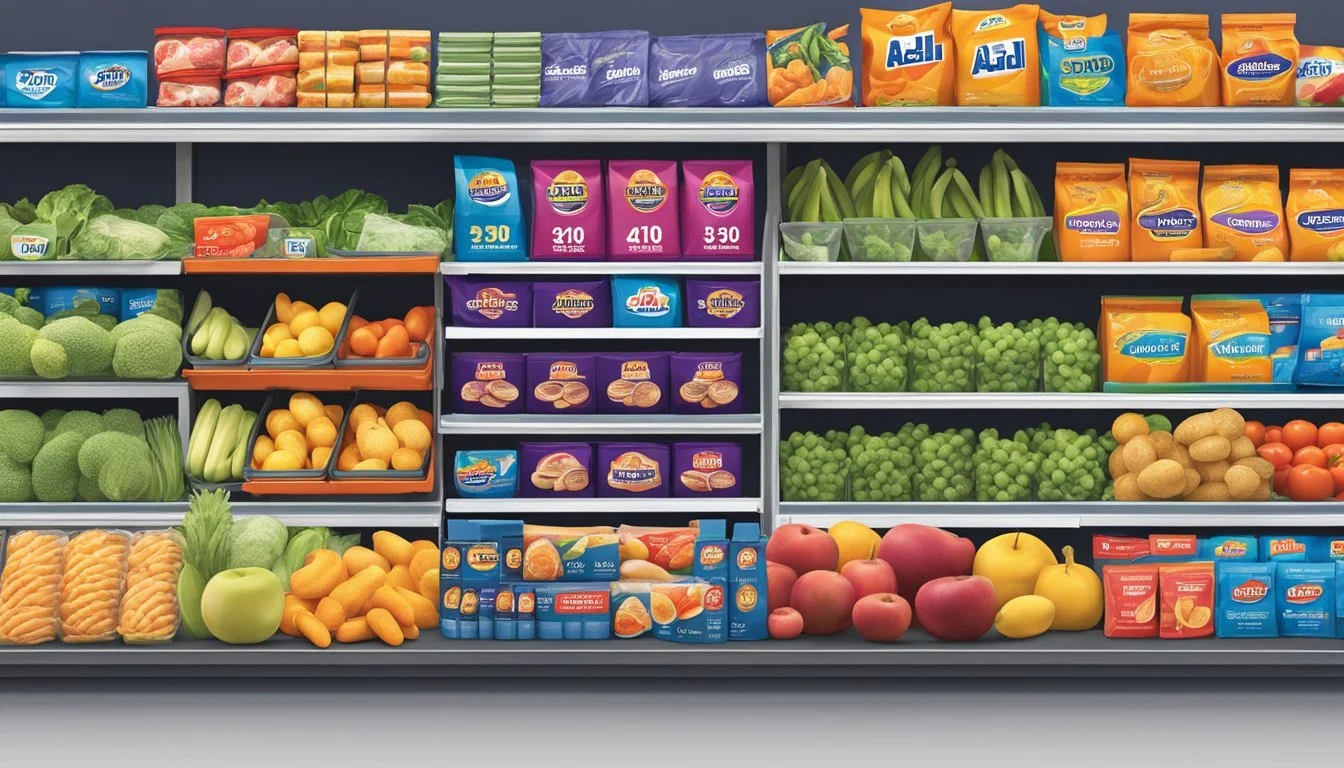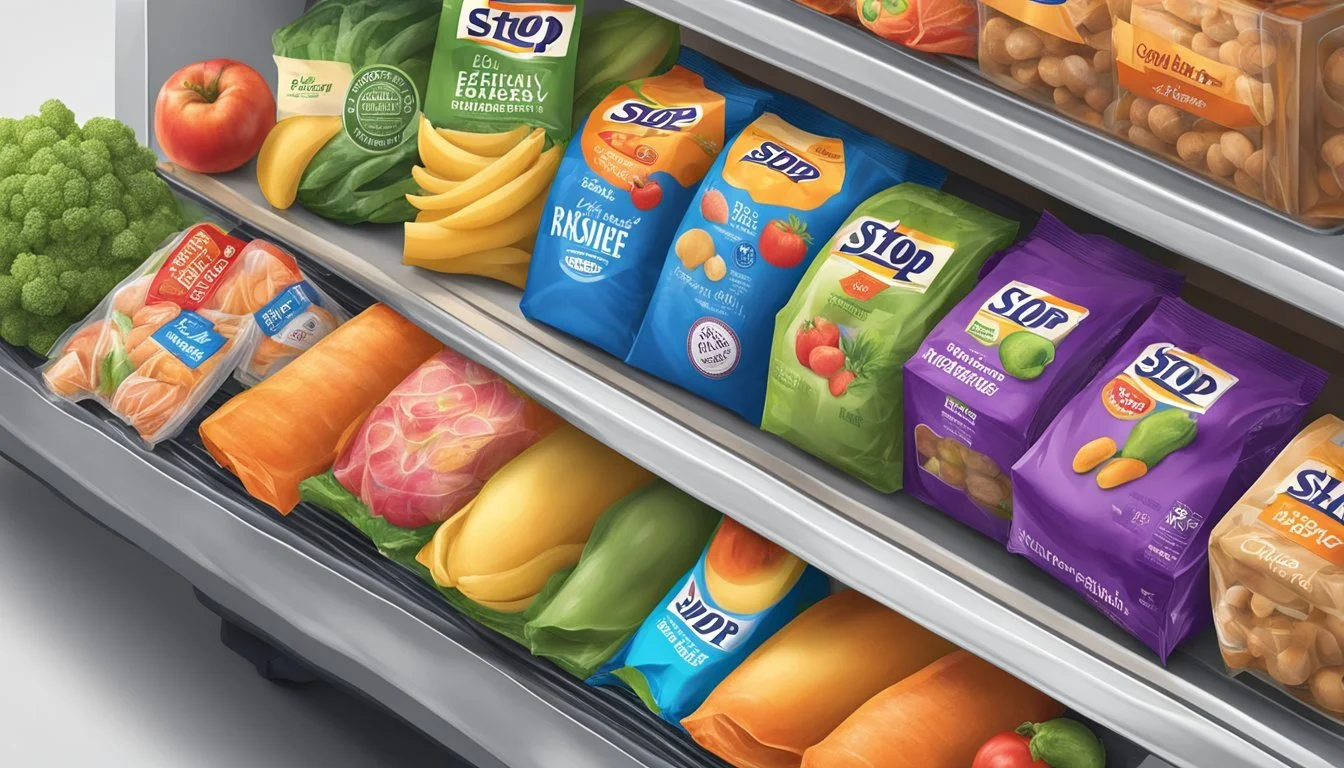Is Aldi Cheaper Than Stop & Shop?
Comparing Grocery Prices
Part of Our Grocery Store Guide with Details on Aldi Prices and Stop & Shop Prices
When considering grocery shopping options, price is often a paramount concern for consumers, and the competition between different retailers can affect where they choose to spend their money. Aldi and Stop & Shop are two prominent chains with distinct business models, catering to budget-conscious shoppers. Aldi operates on a low-cost, private-label approach, which allows it to offer products at lower prices by focusing on cost-cutting at various levels of operations and sourcing mainly in-house brands. This strategy is aimed at providing value to customers by minimizing expenses and passing the savings directly to consumers.
On the other hand, Stop & Shop offers a different shopping experience, providing a wider variety of brand-name products along with its own store brands, which may appeal to shoppers looking for specific items or a more traditional supermarket layout. The higher operational costs associated with a larger product range and maintaining bigger stores are often reflected in their pricing, though this does not necessarily equate to higher overall costs for the consumer. By analyzing pricing of a range of common items, a clearer picture emerges of which store can be deemed more affordable, but it's important to consider that prices can vary by location, and the presence of local competitors can influence pricing strategies at nearby stores.
Moreover, shoppers’ preferences for product quality, selection variety, and shopping convenience must be balanced against pure price considerations. While Aldi is recognized for its cost-saving measures, Stop & Shop's diverse offering might justify the potentially higher prices for customers looking for a one-stop shop with more selection. Identifying which retailer is cheaper may not solely hinge on the numbers at the register, but also on the perceived value each store provides to its individual customers.
Overview of Grocery Pricing
When shopping for groceries, consumers are often looking for the lowest prices without compromising on quality. Price comparison is a key tool for budget-conscious shoppers. Understanding the factors that influence pricing and the differing strategies employed by grocery stores can lead to significant savings.
Factors Affecting Grocery Store Prices
The pricing of groceries is impacted by a myriad of factors. These range from operational costs, such as labor and rent, to the economy's inflation rates. Additionally, supply and demand play a crucial role; for example, seasonal products may be cheaper when they are abundant. Bulk purchasing and the store's branding also dictate the price point – premium brands often command higher prices due to perceived quality.
Operational Costs: Labor, rent, utilities
Economic Factors: Inflation rates, supply chain disruptions
Supply and Demand: Seasonal availability of produce
Purchasing Strategies: Bulk buying, exclusive supplier contracts
Branding: Premium brands vs. store brands
Comparison of Pricing Strategies
Grocery stores employ different pricing strategies to attract customers. Aldi, known for its low prices, opts for a cost-leadership approach, minimizing operational costs by offering a select range of products and utilizing private labels. Stop & Shop, on the other hand, focuses on a more diversified product selection, which may lead to slightly higher prices. The comparison between Aldi and Stop & Shop reveals that while the former tends to offer lower prices on many items, the latter provides customers with greater variety.
Aldi:
Strategy: Cost-leadership
Overall Pricing: Typically lower
Range Offered: Limited; focused on essentials
Stop & Shop:
Strategy: Product differentiation
Overall Pricing: Generally higher
Range Offered: Extensive; includes specialty items
Information reported from price comparison analyses indicates that Aldi's pricing on average tends to be more cost-effective than Stop & Shop. However, the highest value to a customer may depend on their specific shopping needs and preferences.
Assessing Product Range
When comparing Aldi and Stop & Shop, the product range, particularly in store brands, fresh produce, and meat and dairy offerings, plays a critical role in consumer choice.
Variety of Brands Offered
Aldi is known for its focus on store brands. Customers typically find a selection of private labels that are exclusive to Aldi, resulting in competitive pricing. In contrast, Stop & Shop boasts a more extensive variety of brands, including national brands and name brands beyond its own store brands. The larger assortment provides shoppers with more options to meet personal preferences.
Availability of Fresh and Seasonal Produce
The availability and quality of fresh produce can vary greatly depending on the season. Aldi offers a range of produce including both conventional and organic options. Stop & Shop, on the other hand, tends to provide a broader selection of seasonal produce, accommodating consumers’ needs for variety throughout the year.
Assortment of Meat and Dairy Products
Both stores offer a variety of meat and dairy products. Aldi's model leads to a curated selection, primarily composed of its store brand, whereas Stop & Shop provides a wider range in brands, including more well-known national options. This breadth in Stop & Shop’s range allows for greater choice in terms of both quality and price points for the customer.
Cost Analysis
This section presents a detailed comparison of product prices between Aldi and Stop & Shop, taking into account variations in cost due to seasonality.
Price Breakdown by Product Type
Fruits and Vegetables: At Aldi, staple produce like bananas, carrots, and potatoes typically come with lower price tags in contrast to Stop & Shop, which offers a more extensive selection. For example, a bunch of bananas may cost around $0.44 per pound at Aldi, whereas Stop & Shop prices them slightly higher, at around $0.59 per pound.
Table: Sample Price Comparison for Select Produce
Item Aldi Price Stop & Shop Price Bananas (per lb) $0.44 $0.59 Carrots (1lb bag) $0.89 $0.99 Potatoes (5lb bag) $2.49 $2.79
Dairy and Eggs: Dairy products such as milk, butter, and eggs often show competitive pricing at Aldi, which tends to keep costs lower due to their private label brands. A gallon of milk could be priced at $2.95 at Aldi as opposed to Stop & Shop's price of $3.29.
List: Price Range for Dairy Essentials
Milk (gallon): Aldi - $2.95, Stop & Shop - $3.29
Butter (1lb): Aldi - $2.49, Stop & Shop - $2.99
Eggs (dozen): Aldi - $1.29, Stop & Shop - $1.59
Meat and Poultry: For meats, Aldi's offerings like ground beef and chicken breasts are often more affordable due to fewer brand-name options. A pound of ground beef at Aldi can cost around $3.49, compared to Stop & Shop's $3.99. Chicken breasts show similar trends.
Table: Meat Price Comparison
Item Aldi Price Stop & Shop Price Ground Beef (per lb) $3.49 $3.99 Chicken Breasts (per lb) $1.89 $2.29
Pantry Staples: Dry goods, canned goods, and baking essentials including rice, black beans, and cereal are also generally less expensive at Aldi. A 1 lb bag of white rice might be sold at $0.99 at Aldi, while Stop & Shop could offer the same quantity for $1.29.
Bullets: Cost of Select Pantry Items
White Rice (1lb): Aldi - $0.99, Stop & Shop - $1.29
Black Beans (canned): Aldi - $0.59, Stop & Shop - $0.79
Cereal (per box): Aldi - $1.29, Stop & Shop - $1.99
Effects of Seasonality on Pricing
Seasonal Produce: Prices of seasonal items such as strawberries, blueberries, and raspberries may fluctuate based on the time of year. Aldi and Stop & Shop both offer lower prices during peak seasons. For instance, a pint of blueberries can drop to $1.99 at Aldi and $2.49 at Stop & Shop during summer months.
Italics: Seasonal Price Changes for Berries
Strawberries (pint): Spring/Summer - Aldi: $1.49, Stop & Shop: $1.79
Blueberries (pint): Summer - Aldi: $1.99, Stop & Shop: $2.49
Raspberries (6 oz.): Summer - Aldi: $1.69, Stop & Shop: $1.99
Holiday Baking Goods: Items essential for holiday baking, such as spices, flour, and sugar, can see a reduction in price during holiday seasons at both retailers, though Aldi's pricing is typically more economical due to bulk offers and private labels.
List: Sample Holiday Season Pricing for Baking Goods
Flour (5lb bag): Aldi - $1.15, Stop & Shop - $1.79
Sugar (4lb bag): Aldi - $1.95, Stop & Shop - $2.39
Baking Powder (10oz): Aldi - $0.99, Stop & Shop - $1.29
Special Offers and Discounts
When comparing Aldi and Stop & Shop, special offers and discounts play a significant role in overall savings for consumers. These promotions can greatly influence the final bill, enabling shoppers to save money on their grocery purchases.
Coupons, Deals, and Promotions
Aldi is known for its private label products and low everyday prices, which generally do not require the use of coupons. Instead of traditional manufacturer coupons, Aldi offers weekly specials known as Aldi Finds which are limited-time sales on an assortment of items that can range from food to seasonal merchandise. These discounts are automatically applied at checkout, providing straightforward savings without the need for paper or digital coupons.
Stop & Shop, on the other hand, accepts manufacturer coupons and often provides store-specific promotions. Shoppers at Stop & Shop can take advantage of these discounts by using:
Paper Coupons: Traditional coupons clipped from newspapers or flyers.
Digital Coupons: Accessible through Stop & Shop's website or mobile app, these coupons can be added to the shopper's loyalty card and redeemed at checkout.
Additionally, Stop & Shop runs regular sales events and offers a weekly circular with the current deals. Customers can also enroll in the Stop & Shop loyalty program for personalized discounts and accumulate points that can lead to gas savings, an appealing benefit for those looking to stretch their shopping dollar further.
Savvy Shopping Tips
Customers aiming to stretch their dollar at the grocery store can benefit from adopting a couple of strategic approaches. By maximizing value through meal planning and using a grocery list effectively, frugal shoppers can achieve considerable savings.
Maximizing Value Through Meal Planning
Meal planning can be a potent tool for individuals seeking to save money at stores like Aldi. By planning meals around Aldi's private label products, which tend to be cheaper, patrons can effectively decrease their weekly grocery expenditure. Meal kits, such as Tyson's ready-made pot roast designed for the slow cooker, can also provide both convenience and cost-effectiveness, satisfying the dual needs of time savings and budget-friendliness.
To maximize the value, customers are encouraged to:
Look out for weekly Aldi Finds for unique and limited-time offers.
Consider Aldi's private label items which are often priced lower than name brands.
Effective Utilization of a Grocery List
Creating and adhering to a grocery list is an excellent habit for budget-conscious customers. Shoppers who visit Aldi with a list tailored around Aldi's smaller inventory model tend to buy what they need, thus avoiding extra purchases that may lead to food and money waste. Aldi's limited selection ensures customers spend less time in the store, streamlining the shopping experience.
To optimize savings with a grocery list, shoppers should:
Stick to the list strictly to minimize impulsive buys.
Focus on purchasing essential items first to avoid overspending.
By preparing a well-considered grocery list and sticking to it, customers can become more efficient in their shopping habits and more effective in managing their budgets.
Additional Factors to Consider
When comparing the pricing of grocery stores like Aldi and Stop & Shop, shoppers should consider not only product prices but also other aspects that contribute to the overall shopping experience. These include location, store atmosphere, and service quality, all of which can significantly impact customer satisfaction and the perceived value of shopping.
Impact of Location and Shop Accessibility
Aldi tends to have a strategic approach to location, choosing areas with easy access to a broad customer base. Stop & Shop generally emphasizes convenience for shoppers as well, but its store network might not match the reach of larger chains like Walmart or Target. Customers should consider travel distance and location when assessing which store offers better value, taking into account any additional time or travel costs incurred.
Store Ambiance and Customer Experience
Shoppers often take into account the shopping environment when choosing where to shop. Aldi’s more utilitarian layout and emphasis on efficiency might not appeal to those who prefer the wider aisles and more diverse product displays found at Stop & Shop. In contrast, stores like Target and Costco focus on creating an engaging customer experience, which could justify slightly higher prices for some shoppers.
Service Quality and Checkout Efficiency
Service standards can differ significantly among grocery stores. Aldi is known for its fast checkout process, helping keep costs down and passing savings onto the customers. However, some shoppers might find a trade-off in personal service compared to Stop & Shop. Larger competitors such as Walmart or Amazon offer additional services like online ordering and home delivery options, adding to the overall service quality and convenience for their shoppers. The efficiency of services like checkout and delivery is an essential consideration for customers prioritizing time savings along with costs.
Comparative Analysis With Other Retailers
In the landscape of retail grocery shopping, Aldi and Stop & Shop present contrasting models in terms of pricing, product variety, and store layout. They not only compete with each other but also against large-scale retailers like Walmart and Target, and wholesale clubs such as Costco. This section will provide a comparative analysis focusing on how these stores distinguish themselves in terms of cost and product offerings.
How Aldi and Stop & Shop Stack Against Walmart and Target
Aldi is known for its cost-saving approach, largely due to its focus on private labels and streamlined store operations. This often allows Aldi to offer lower prices compared to many of its competitors. Walmart, however, has emerged as a strong competitor in the grocery sector, often matching or undercutting Aldi's prices due to its immense scale and purchasing power.
Item Aldi Price Walmart Price Stop & Shop Price Almond Butter (12oz) $3.89 $4.98 N/A
While Aldi provides notable savings, as seen in the almond butter price comparison, Walmart consistently delivers competitive prices across a wide range of products.
Target, on the other hand, often positions itself differently, emphasizing branded products and a shopping experience that caters to a more upscale market. Consequently, its prices might be higher than both Aldi and Walmart, but it offers a broader selection of goods, something Aldi's typically smaller stores do not match.
Stop & Shop offers a larger variety compared to Aldi, providing consumers with more options. Its extensive product range can occasionally lead to better deals for shoppers looking for specific brands or products not carried by Aldi.
Price Comparison With Wholesale Clubs Like Costco
Comparing prices with wholesale clubs such as Costco involves evaluating bulk purchasing. Costco's business model is based on membership and selling products in larger quantities, which generally allows for reduced per-unit costs.
Item Aldi Price Costco Price Milk (1 gallon) $2.49 $2.35 (in bulk)
Prices at Costco may often be cheaper on a per-unit basis when compared to Aldi, but this requires a larger upfront purchase and a paid membership. Consumers need to consider both the annual membership fee and their ability to store and use bulk goods when determining the actual savings.
While Aldi is well-suited for everyday small-to-medium size shopping trips, Costco appeals to those who prefer to stock up on items, offering savings in the long term. Each retailer addresses different shopper needs, and price-conscious consumers benefit from assessing both overall cost and shopping frequency.
Consumer Insights
When evaluating whether Aldi is cheaper than Stop & Shop, customer experiences and preferences provide critical insight into the relative value and appeal of both stores.
Customer Reviews and Testimonials
Customers often cite low prices and savings at Aldi due to its predominantly private label strategy. Shoppers there have been known to appreciate the financial benefits of Aldi's approach, which allows it to offer products at a lower cost compared to name-brand items often found at competitors like Stop & Shop. While Aldi may carry fewer products, testimonies frequently highlight that the quality of its offerings often meets or exceeds expectations given the price point.
In contrast, reviews indicate that Stop & Shop provides a wider variety of products, which appeals to customers who prioritize selection over the lowest possible price. Testimonials from Stop & Shop customers tend to emphasize the store's ability to supply nearly all of their grocery needs, including name-brand items that are familiar and trusted.
Brand Loyalty and Consumer Preference
Brand loyalty for Aldi and Stop & Shop is shaped strongly by consumer experiences with each store's pricing strategy and product availability. Despite its smaller selection, Aldi garners a loyal following among price-sensitive shoppers who prioritize savings and are satisfied with the quality of its private label goods. The explicit strategy to keep costs low and pass the savings to consumers fosters an environment for building a community of regular customers.
Stop & Shop's wider product offering, featuring both private and name-brand items, attracts customers who seek variety or specific brands they trust. A higher number of options can enhance shopper loyalty for those who prefer a one-stop shopping experience where they are more likely to find everything on their list.
In terms of product quality, both Aldi and Stop & Shop have their advocates. Some customers may prefer the familiar quality of known brands at Stop & Shop, while others are happy with the quality relative to the low prices provided by Aldi. The individual preferences based on these factors play a significant role in shaping consumer behaviors and brand loyalty for each store.
Shopping Convenience
When comparing the shopping convenience of Aldi and Stop & Shop, customers will notice differences in the in-store shopping experience and the availability of online shopping options and delivery services.
In-Store Shopping Experience
Aldi focuses on a streamlined approach to in-store shopping, typically offering a no-frills environment with basic store layouts. They carry mostly private label brands which allows them to offer lower prices. They also implement cost-saving measures such as a cart rental system, where shoppers insert a coin to use a cart and receive it back upon the cart's return. This system encourages shoppers to return their own carts, reducing the need for additional staff to manage the carts.
Stop & Shop, on the other hand, provides a traditional supermarket experience with a wider range of brand-name products and a larger selection overall. They have more than 21 times the amount of products compared to Aldi, ensuring that shoppers are likely to find a greater variety of goods, including specialty items.
Online Shopping Options and Delivery Services
Both Aldi and Stop & Shop offer online shopping and delivery services, but there are variations in their offerings.
Aldi: Partners with third-party providers for online shopping and delivery options. The reach of these services might be limited by location, and there may be additional fees associated with their use.
Stop & Shop: Has its proprietary platform which allows customers to shop online directly through the store's website or app. They also offer delivery services in several locations, providing convenience to shoppers who prefer to order from home.
In both cases, online shopping and delivery options have become increasingly important for today's consumers, offering them time-saving conveniences that can outweigh potential additional costs.
Budget Management
When examining grocery shopping options from a budget management perspective, it is crucial for consumers to identify the store that offers the greatest savings. Cost-conscious shoppers aim to save money without compromising on the variety and quality of products they purchase.
Analyzing the Cheapest Option for Household Shopping
In the quest to determine the cheapest option for household shopping, comparing the prices at Aldi and Stop & Shop reveals key insights. Aldi is known for its private label products, which are typically lower in price compared to branded items. Stop & Shop, on the other hand, offers a broader variety of products, which may affect its pricing structure.
Recent price comparison studies suggest that Stop & Shop can sometimes offer a lower total price on a consumer's grocery bill. However, the price differences can be marginal. For instance, one analysis found Stop & Shop to be merely $1.45 cheaper on a total bill, a difference of about 1%. This indicates that both stores are competitive in their pricing, but the final choice may depend on the specific items a shopper needs.
Consumers should approach their shopping with a plan:
Make a list of items needed and stick to it to avoid unintended purchases.
Check for weekly deals as both stores may have specials that can contribute to the budget.
Consider product preferences—private labels may result in savings, but some shoppers have brand-specific needs.
Managing a grocery budget effectively requires a careful balance of savings, product variety, and shopping preferences. Shoppers striving to save money should not only look at the bottom line but also consider the availability of all items they require. This reduces the need to shop at multiple stores, thereby saving time and potentially reducing extra transportation costs.
Household Staples Pricing
When comparing Aldi and Stop & Shop, a focus on the pricing of essential household staples reveals where consumers can stretch their dollars further.
Cost of Essential Items
Milk: Aldi typically offers lower prices on milk, with savings that are especially noticeable for consumers purchasing milk regularly.
Rice: Shoppers often find that Aldi's rice selection, while more limited, is priced more competitively than Stop & Shop.
Bread: Bread is a staple where Aldi again generally undercuts Stop & Shop's prices, offering good quality at a lower cost.
Household Items: For general household items like cleaners and detergents, Aldi's private labels provide a cost-effective alternative to Stop & Shop's wider brand selection.
Pantry: Pantry essentials such as canned goods, flour, sugar, and spices are typically sold at lower prices at Aldi.
Condiments: Stop & Shop offers a diverse range of condiments, but for the budget-conscious, Aldi's smaller selection comes with smaller price tags.
Toilet Paper: Aldi's toilet paper options can save shoppers money without sacrificing quality.
Diapers: Parents may find that the cost of diapers at Aldi is less than at Stop & Shop, offering significant savings over time.
Paper Products: Shoppers looking to save on paper towels and napkins will likely find better deals at Aldi.
Toiletries: While Stop & Shop has a wide variety of brands, Aldi provides competitively priced toiletries, often under its exclusive brands.
Soda: For soda drinkers, Aldi's store brand offers a more affordable alternative to the name brands available at Stop & Shop.
Item Aldi Stop & Shop Milk Cheaper More Expensive Rice Cheaper More Expensive Bread Cheaper More Expensive Household Items More Affordable Options Wider Selection Pantry Essentials Lower Priced More Variety Condiments Less Expensive More Variety Toilet Paper Economical More Brands Available Diapers Budget-friendly Pricier Paper Products Lower Priced More Expensive Toiletries Competitive Prices Wide Brand Range Soda Cheaper Store Brand Brand Name Options
It is important for shoppers to consider not only the price but also the variety and brand preferences when choosing between Aldi and Stop & Shop for their grocery needs.
Quality and Affordability
When considering grocery shopping from the perspective of both quality and affordability, consumers often weigh their options between discount supermarkets such as Aldi and more conventional chains like Stop & Shop. The comparison often boils down to not just the lowest price point but also to the quality of products available.
Balancing Price and Quality for Optimal Value
Aldi has built its reputation on being a cheap grocer by offering a wide range of private label products, which keeps prices low. Private labels are comparable in quality to national brands and offer significant savings to customers. For instance, Aldi's strategy to focus on exclusive brands allows them to offer lower prices on many items, including staples like dairy products which tend to be significantly cheaper than competitors. The cost savings are not at the expense of quality, as Aldi often carries a selection of organic products that are both affordable and high standard.
On the other hand, Stop & Shop provides a broader assortment of products including national brand names that consumers are familiar with, which supports their perception of quality. Although Stop & Shop's variety is vast, giving consumers access to more than 21 times the number of products as Aldi, this does not automatically translate into higher prices. For example, price comparisons reveal that Stop & Shop can offer lower prices than Aldi on certain products, sometimes by a small margin.
Both Aldi and Stop & Shop provide value to customers, but they do so in different ways. Aldi's approach is to minimize costs through private labels and a focused product selection, while Stop & Shop offers a diverse product range, including both low-cost and premium options, catering to a broader market. Consumers can find the balance between price and quality by being selective about which items to purchase from each retailer, depending on their personal preferences and budget constraints.
Product Selection Analysis
In comparing Aldi and Stop & Shop, a distinct difference emerges in their approach to product offerings. Aldi centralizes on a model of limited product lines, prioritizing private labels and cost efficiency, while Stop & Shop embraces a vast product assortment to cater to varied customer needs.
Comparison of Narrow vs. Extensive Product Lines
Aldi is known for its small selection, often carrying exclusively private label products. Reports indicate that it focuses on a narrow variety – offering fewer product lines but at lower prices. Their strategy includes a rotating weekly special known as "Aldi Finds" which introduces new, non-standard items regularly.
Product Lines: Typically limited to essential grocery and household items.
Boxes: Products are often displayed in their original boxes to save on shelving costs.
Stop & Shop, on the other hand, provides an extensive variety of products including name brands and specialty items. With more than 21 times the amount of products compared to Aldi's offering, customers have a higher chance of finding specific items they need.
Product Lines: Wide range, from groceries to personal care, with multiple brand options.
Boxes: Items are usually shelved traditionally, taken out of boxes for aesthetic retail display.
The contrast in product selection philosophy impacts consumer choice – Aldi's cost-saving model appeals to budget-conscious shoppers who are content with a more streamlined selection, while Stop & Shop's extensive variety caters to those seeking specific brands or products, even if it might come at a higher cost.
Urban Grocery Shopping
Urban grocery shopping presents a unique set of challenges due to the dense population and limited space, but it also offers opportunities for retailers to provide variety and quality services tailored to city lifestyles.
Challenges and Opportunities in City Grocery Shopping
In urban settings, consumers often face the challenge of finding stores near their location that provide a wide variety of products. Retailers like Aldi and Stop & Shop have adapted to the city environment by opening smaller stores and streamlining their product offerings. This balance maintains variety while catering to the urban consumer's need for convenience and accessibility.
Stop & Shop typically offers an extensive product range to meet the diverse needs of an urban population. They have various locations which can be strategically placed throughout cities, ensuring that consumers have access to their extensive variety of goods. This variety includes fresh produce, organic options, and international foods that suit the palates of a cosmopolitan customer base.
Aldi, with its compact store size, tends to focus on cost efficiency, which can be a significant advantage in urban areas where space is at a premium.
Services offered by both chains can vary widely depending on the urban market they serve.
Locations are chosen based on thorough market research to optimize foot traffic and sales, considering the dense and complex urban layouts.
Variety in product selection can be notably different between Aldi and Stop & Shop, with Aldi offering a more curated selection of essentials and Stop & Shop providing a broader range.
The retailers’ strategies reflect a deep understanding of urban shopping dynamics, where customers prioritize location, convenience, and speed of service, but also value the availability of a wide variety of products within easy reach.
Lifestyle and Specialty Items
When comparing Aldi and Stop & Shop, a shopper's selection becomes a crucial factor, particularly in terms of lifestyle and specialty items, which include organic produce, a variety of frozen goods, and diverse snack options such as berries and chips.
Assessing Availability of Organic and Specialty Products
Aldi has made a name for itself by offering an array of specialty items at competitive prices. Their organic produce selection, while not as expansive as some larger chains, features staples such as organic berries and mixed greens at often lower prices. The store's private label includes an organic line that caters to health-conscious customers.
Stop & Shop, in contrast, boasts a more extensive selection of organic and specialty products. They offer a broader variety of organic produce, which can include exotic fruits and vegetables not typically found at Aldi. Their offerings extend to a wide array of frozen specialty items, giving consumers more choices for convenient meal preparation.
When it comes to snacks like chips, both stores provide numerous options, with Aldi focusing on its cost-effective brands and Stop & Shop stocking a mix of mainstream and niche brands that cater to different tastes. Specialty items, such as gluten-free or vegan products, are increasingly common on both retailers' shelves.
Shoppers searching for specialty frozen items might prefer Stop & Shop due to their larger assortment. Conversely, for those prioritizing budget-friendly organic basics, Aldi's select but competitively priced stock could suffice.
The decision on where to shop often comes down to one's preference for variety versus value, particularly in the context of lifestyle and specialty items.











